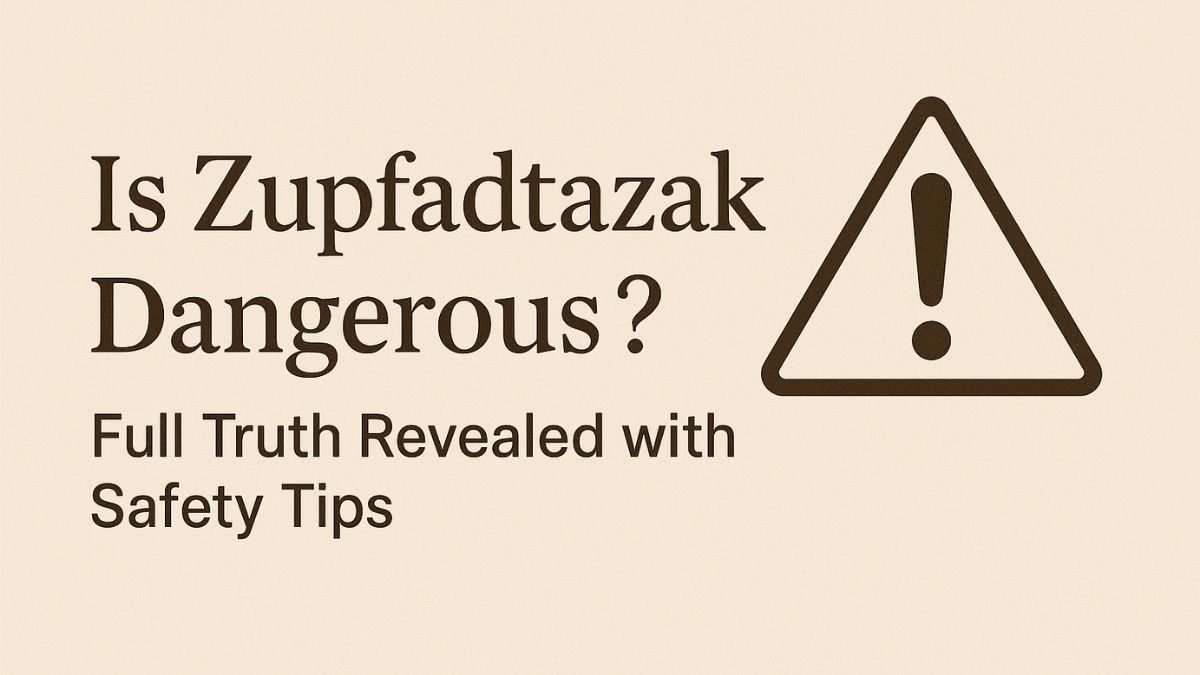
Is Zupfadtazak Dangerous? The Truth You Need to Know
In the digital world today, many strange names and terms pop up online—and one of them is zupfadtazak. You might have come across this mysterious word on social media, forums, or even search engines, asking, “Is zupfadtazak dangerous?” If you’re curious, confused, or even concerned, you’re not alone.
The internet is full of unknowns. Some of them are just trends or made-up names, but others could be linked to real dangers. Our goal in this article is to uncover the truth about zupfadtazak, explain whether it poses any harm, and provide useful tips to stay informed and protected.
What Is Zupfadtazak?
Before diving into whether zupfadtazak is dangerous or not, let’s first try to understand what this term actually means.
Is Zupfadtazak a Real Word?
Zupfadtazak is not a recognized word in the English dictionary, nor is it a known term in science, medicine, or popular culture. It doesn’t appear in any verified medical databases or academic publications. So, what is it?
- It may be a nonsensical term generated randomly.
- It could be a malware-related code name, a phishing keyword, or a scam-related phrase.
- It might even be a testing keyword for online algorithms or SEO strategies.
Because of its unusual nature, the keyword “zupfadtazak” is often searched out of curiosity, especially when people see it associated with “dangerous.”
Why Are People Asking If Zupfadtazak Is Dangerous?
Online Buzz and Confusion
People are increasingly searching “is zupfadtazak dangerous” because the term often appears randomly in blogs, spam comments, or bot-generated content. This raises a red flag. Usually, when something confusing or cryptic appears online, it’s either:
- A scam
- A virus name
- A malicious keyword used by hackers
That’s why the concern is valid.
Algorithm Testing or Malware Trap?
Some experts believe that zupfadtazak is possibly part of AI-generated content used to test search engine behavior. Others think it’s a hidden keyword in black-hat SEO practices to trick Google into ranking fake content.
Either way, anything that doesn’t make sense but shows up frequently in online spaces should be treated with caution.
Is Zupfadtazak Dangerous to Your Device or Health?
There is no direct evidence that zupfadtazak causes physical harm. But the digital dangers connected to it are real.
Potential Digital Dangers of Zupfadtazak:
1. Malware and Viruses
Some links associated with “zupfadtazak” may redirect you to suspicious websites that:
- Try to install malware
- Collect your personal information
- Trick you with fake warnings or pop-ups
2. Phishing Scams
In some cases, this keyword is part of a larger scam where the user is told to click a link, download something, or fill in a form. This could lead to:
- Identity theft
- Financial fraud
- Data leaks
3. SEO Spam
Websites using this word might be low-quality content farms built to manipulate Google’s algorithm. Visiting such sites offers no real value and could affect your device or data.
How to Stay Safe Online When You See Strange Terms
1. Don’t Click Unknown Links
If you see a suspicious word like zupfadtazak in a link, don’t click it. Always double-check the source.
2. Use Trusted Antivirus Software
A reliable antivirus can detect and block threats before they harm your device.
3. Report Suspicious Activity
If you find content that seems misleading, spammy, or harmful, report it to:
- Website admins
- Your browser’s safety team
4. Use Strong Passwords and 2FA
Even if zupfadtazak isn’t directly harmful, online scams are. Protect yourself by using secure passwords and two-factor authentication.
Can Zupfadtazak Affect SEO or Website Ranking?
Yes. If you run a website and include random or spammy keywords like zupfadtazak, it can hurt your site’s ranking. Here’s how:
1. Google Penalizes Irrelevant Keywords
Google’s algorithm is smart. If it sees strange, meaningless words used just to gain traffic, it may:
- Lower your ranking
- Flag your content as spam
- Remove your page from results
2. Users Leave Quickly (High Bounce Rate)
If users land on a page expecting value and see nonsense, they leave right away. This tells Google your content is:
- Not trustworthy
- Not useful
- Not relevant
So, whether you’re a reader or a content creator, stay away from fake or unclear terms like zupfadtazak unless you’re explaining it properly (like in this article!).
The Psychology Behind “Zupfadtazak Dangerous”
Why are people so drawn to weird words like this? It’s all about curiosity and fear of missing out (FOMO).
1. Curiosity Trigger
The brain is wired to notice things that are unusual or unknown. A strange word catches our attention.
2. Fear of a Hidden Threat
When paired with “dangerous,” it creates fear: “What if this is something serious I don’t know about?”
That’s why it’s important to stay informed and verify facts instead of falling for misleading headlines or trends.
How to Recognize Dangerous Internet Trends
To avoid falling into scams, here’s how to analyze any strange keyword or online trend:
| Checklist | What to Do |
|---|---|
| Is it in the dictionary? | Search official sources to check authenticity. |
| Is it on trusted sites? | See if known websites mention it. |
| Does it make sense? | Read the context—does it actually provide value? |
| Are there real sources? | Avoid content with no sources or fake citations. |
Conclusion: Should You Worry About Zupfadtazak?
To wrap it up, zupfadtazak itself is not dangerous, but the web pages, links, or scams connected to it could be. It’s more of a digital red flag than a real-world threat. Think of it as a sign that something suspicious might be going on behind the scenes.
So, if you ever come across this word again, you now know what to do: stay alert, don’t engage, and protect your devices.
Stay Smart, Stay Safe
With so many strange terms floating around the internet, it’s easy to get tricked. But with the right knowledge, you can spot the danger, avoid it, and even help others stay informed. Let’s keep the internet safe—one strange keyword at a time.
FAQs About Zupfadtazak
1. What is zupfadtazak?
Zupfadtazak is a nonsensical or possibly AI-generated word with no official meaning. It may be linked to spam, scams, or SEO experiments.
2. Is zupfadtazak a virus?
There’s no proof it’s a virus itself, but some pages using the keyword may lead to malware-infected sites.
3. Should I avoid websites using this word?
Yes. If the content around the word doesn’t explain it clearly, it’s best to avoid such pages—they could be scams or unsafe.
4. Is zupfadtazak part of a scam?
It might be. The keyword is often found in spam content or low-quality SEO pages, which could be tied to phishing or clickbait.
5. Can I use zupfadtazak for SEO?
No. Using meaningless or misleading keywords can harm your rankings and get your site penalized by search engines.



